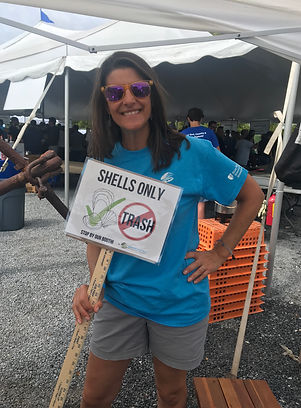
Shell Recycling
Building a Foundation for Oyster Reefs
We build oyster reefs in Shinnecock Bay using a “spat-on-shell” approach, which requires lots of clean, bare shell for oyster larvae to settle upon. One challenge for practitioners like us is acquiring enough shell to create these building blocks. Shell recycling programs are a key way to obtain this essential material!
Over the past decade, we have sourced our shell through a variety of means including partnerships with commercial shellfish companies, creating a restaurant pick-up program, attending festivals, and receiving shell from non-profit partners.
Believe it or not, shell recycling is easier said than done—it takes a lot of logistical coordination, physical manpower, and time! But it is a win-win, since discarded shell would otherwise end up in a landfill but instead is repurposed to benefit our local waters.
Currently, our main sources of shell come from the Blue Island Oyster Festival, and the Half Shells for Habitat program. Every year, our team attends the Blue Island Oyster Festival in September to collect hundreds of gallons of shell, which is then dried out and cured at our Stony Brook Southampton campus. Additionally, the Half Shells for Habitat program, which runs its own restaurant collection effort, donates clean and cured shell to our program which can be used right away.
Shell Recycling Process

Shells are collected from restaurants and Oyster Festival

Shells are dried and sanitized
.jpg)


Clean shells are put into bags to become home to new spat growth
Once large enough, the oyster bags are put into one of ShiRPs oyster reefs
1.
2.
3.
4.
5.
The bags grow into a living reef
A big thank you to our shell suppliers
Without your partnership, we couldn't build our reefs.





Our success to date...


8
Oyster Reefs Built
Spat on shell
5 Million
3750
Gallons of shells collected



